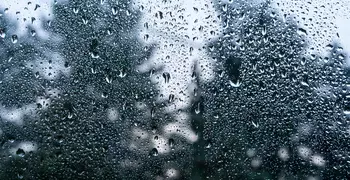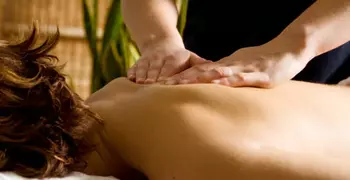Reiki
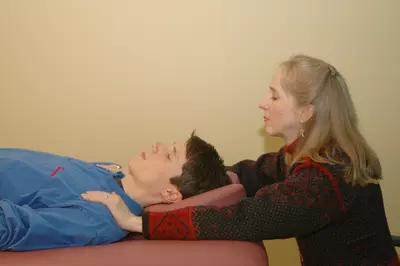
How Can Reiki Help Me?
People use Reiki to relax and strengthen their wellbeing; reduce pain, anxiety, and fatigue; help manage symptoms; reduce side effects of medications; and support recovery after injuries or surgery. According to a national survey published in 2007, 1.2 million adults and 161,000 children received one or more sessions of an energy therapy such as Reiki in the previous year.
Reiki is a good integrative therapy to try because people generally start feeling better very quickly with Reiki. As anxiety and pain lessen, and people feel hopeful about regaining their health, they feel more able to incorporate other needed health interventions or make needed lifestyle changes. Reiki therapy often clears the mind, enabling patients to better evaluate the sometimes conflicting medical information being offered by various specialists, so they can make important treatment decisions with greater confidence. In this way, Reiki can help people become more actively involved in their own health.
Reiki can be received from someone else (either a friend, healthcare provider, or Reiki professional), or it can be learned by all who want to practice Reiki on themselves.
Today, Reiki is commonly used by three groups:
- The lay public at home, for themselves, family and friends
- Reiki professionals offering therapy in their offices or other wellness and healthcare settings
- Nurses, physicians, and other healthcare professionals, such as physical therapists, dentists, massage therapists, and chiropractors who integrate Reiki into healthcare during office visits or inpatient care in clinics, hospitals, nursing homes, hospices, and other healthcare facilities
How Sophie used Reiki self-care to help with pain, recovery from surgery, and general wellbeing
Sophie may never have known about Reiki if she didn't live next door to a Reiki master. Wanting to be a good neighbor and show support, she accepted an invitation to attend a Reiki intro program.
Nearing 80, Sophie was already on more medications than she liked. She was concerned about the increasing pain in her joints and dreaded an upcoming surgery. Sophie was encouraged to learn that Reiki helps with pain, enabling some people to reduce or stop their pain meds (with their doctors' supervision). And it made sense to her that since Reiki treatment enhances the body's innate ability to heal, it can help people get up and about faster after surgery. Feeling she had little to lose, she signed up for the next class.
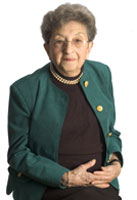 Sophie found much to appreciate in her Reiki class, and especially liked the focus on wellness instead of illness. Practicing Reiki on herself was a quiet revelation, unlike anything she had experienced before. The peacefulness lingered long after the first class session and enveloped her anew when she practiced at home. Back in class, Sophie at first felt tentative to place her Reiki hands on her classmates when they practiced with one another, but her self-consciousness soon melted away.
Sophie found much to appreciate in her Reiki class, and especially liked the focus on wellness instead of illness. Practicing Reiki on herself was a quiet revelation, unlike anything she had experienced before. The peacefulness lingered long after the first class session and enveloped her anew when she practiced at home. Back in class, Sophie at first felt tentative to place her Reiki hands on her classmates when they practiced with one another, but her self-consciousness soon melted away.
Although the teacher said repeatedly that Reiki was primarily for self-care, Sophie noticed the familiar sensation in her hands as she cuddled her grandson before bed and was amazed when the usually rambunctious boy fell asleep on her lap. She frequently told her friends, "I've got a treasure in my hands."
Sophie took her treasure into surgery, giving herself Reiki even as she waited on the gurney. Each time she became conscious in the recovery room, she placed her Reiki hands on her abdomen or chest, as was comfortable, and found that Reiki soothed the discomfort from the incision. Once out of recovery, she continued giving herself Reiki many times a day. Sophie was discharged from the hospital a day earlier than expected.
Five years later, Sophie continues to practice Reiki self-care every day. She and two Reiki friends meet weekly to share treatment-they call it their "Reiki bee"-and she's delighted when her daughter occasionally requests a Reiki session.
Sophie and her physician have stopped some medications and reduced others. She thinks Reiki may be why she is no longer troubled by side effects from the ones she still needs. "I always knew it made sense to be a good neighbor," she laughs, "but I never thought it would change my life!"
How Susan received Reiki to help with fatigue
Susan had been a pediatric nurse for twenty years. She deeply loved caring for children but lately had to admit that fatigue was creeping into her days and keeping her from enjoying her time away from the hospital. Two of her nurse colleagues had recently learned to practice Reiki and kept offering her a session. She didn't know why she felt shy about it, but when nothing else relieved this relentless tiredness, she decided to accept their invitation. 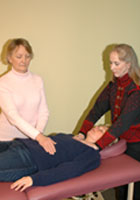
Her colleagues came to her home to give her Reiki one Friday night. They made her promise to let herself sleep until she awakened on her own the next morning. There wasn't much morning left when she woke up after 12 hours of the deepest sleep she could remember. Caroline called her friends to thank them, saying, "It's as if my body had forgotten how to sleep well and the Reiki reminded it."
The next week, Susan witnessed something that made her think more seriously about learning to practice Reiki herself. A young boy with sickle cell anemia was writhing and screaming, racked with the intense pain that accompanies this condition and often doesn't respond to medication. Her colleagues placed their hands on the boy and within five minutes, he was sleeping peacefully, his body completely relaxed.
How Caroline received Reiki for support during breast cancer treatment
There is no convenient time to be diagnosed with breast cancer, but the timing of Caroline's diagnosis was particularly difficult. Her husband was being sent to Madrid on a special assignment and she'd been looking forward to the time abroad and the opportunity to polish her Spanish. Now the timing of their trip coincided directly with the timing of her cancer treatment. Since her treatment could not be done in Spain, Caroline decided to commute. And look for extra help.
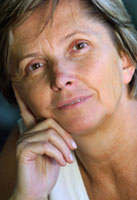 Caroline was practical enough to know she needed support on many levels. She needed emotional support to heal from the impact of the diagnosis and the anxiety that stalked her day and night. Her doctor warned that many people found the treatment itself to be exhausting, and Caroline would be adding to that with the fatigue of frequent flying. She was concerned about pain and, given her history of sensitivity to pharmaceuticals, she was sure she'd experience other treatment side effects.
Caroline was practical enough to know she needed support on many levels. She needed emotional support to heal from the impact of the diagnosis and the anxiety that stalked her day and night. Her doctor warned that many people found the treatment itself to be exhausting, and Caroline would be adding to that with the fatigue of frequent flying. She was concerned about pain and, given her history of sensitivity to pharmaceuticals, she was sure she'd experience other treatment side effects.
Fortunately, her treatment center had a Reiki program. Caroline paired Reiki with each chemotherapy session and doctor visit. Because she was prone to anxiety even on a good day, she made a point to receive Reiki before her chemo. She found receiving Reiki first greatly reduced not only her anxiety, but also her pain.
Caroline weathered her treatment well and finished on time. Once they were resettled at home, Caroline continued receiving monthly Reiki privately. She eventually learned to practice Reiki self-care as a way to protect her health and manage her tendency toward anxiety.
Berger, A., deSwaan, CB. (2006). Healing Pain. Steubenville, OH: Emmaus Road Publishing.
Bossi, LM, Ott, MJ, DeCristofaro, S. (2008). Reiki as a clinical intervention in oncology nursing practice. Clin J Oncol Nurs. 12(3), 489-94.
Caitlin, A. & Taylor-Ford, R. (2011). Investigation of standard care versus sham Reiki placebo versus actual Reiki therapy to enhance comfort and well-being in a chemotherapy infusion center. Oncology Nursing Forum, 38(3), online exclusive article.
Honervogt, T. (2006). Reiki for Emotional Healing. Gaia Pub.
Miles, P. (2007). Reiki for Support of Cancer Patients. Advances in Mind-Body Medicine, 22(2), 20-26: http://www.advancesjournal.com/adv/web_pdfs/miles.pdf.
Miles, P., True, G. (2003). Reiki-Review of a Biofield Therapy: History, Theory, Practice and Research. Alternative Therapies in Health and Medicine, 9(2), 62-72: http://www.reikiinmedicine.org/pdf/alt_therapies_reiki.pdf.
Olson, K., Hanson, J., Michaud, M. (2003). A Phase II trial of reiki for the management of pain in advanced cancer patients. Journal of Pain Symptom Management. 26 (5), 990-97.
Reiki Healing Arts website
Schiller, R. (2003). Reiki: A starting point for integrative medicine. Alternative Therapies in Health and Medicine, 9(2), 20-21, Retrieved March 21, 2007: http://www.reikiinmedicine.org/pdf/schiller.pdf.
Schmehr, R. (2003). Case Report: Enhancing the Treatment of HIV/AIDS with Reiki Training and Treatment. Alternative Therapies in Health and Medicine, 9(2):120: http://www.reikiinmedicine.org/pdf/schmehr.pdf.
Tsang, K., Carlson, L. (2007). Pilot crossover trial of reiki versus rest for treating cancer-related fatigue. Integrative Cancer Therapies, 6(1), 25-35.
